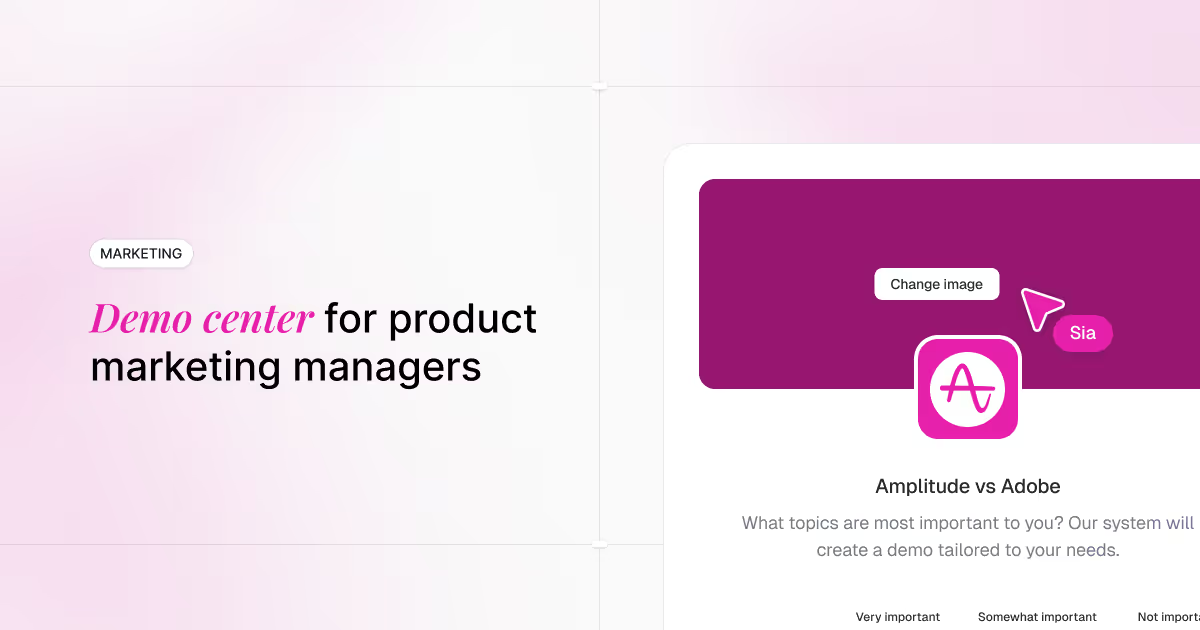Presales teams implementing demo center strategies report 73% higher engagement compared to generic demo links, 60% reduction in demo preparation time through pre-configured environments, and 3x improvement in technical qualification rates when prospects engage with self-service validation before live demonstrations.
These results address critical challenges that presales teams face. As deal complexity grows and technical stakeholders multiply, presales engineers waste hours on unqualified prospects who haven't done basic research, spend excessive time adjusting demo environments for each meeting, and repeatedly deliver the same basic product walkthrough multiple times daily. During peak periods like product launches, teams can't keep up with demo demand, creating bottlenecks that slow response times and cost opportunities.
Demo centers represent a strategic solution by functioning as comprehensive technical evaluation environments that combine interactive product experiences, qualification tools, and integration showcases. From technical validation and RFP responses to sales team enablement and outreach optimization, these platforms transform how presales teams deliver demonstrations while integrating seamlessly with existing sales workflows. The implementation approach provides practical frameworks for scaling technical expertise while preserving presales resources for high-value enterprise conversations and complex integration discussions.
What is a demo center?
A demo center is a centralized, interactive platform that combines technical demonstrations, educational content, qualification tools, and sales assets into one cohesive technical evaluation experience. Unlike traditional approaches that rely on individual live demos or scattered technical documentation, demo centers create comprehensive technical validation journeys tailored to different technical stakeholders, integration requirements, and evaluation stages.
At its core, a demo center functions like a self-serve technical showroom where prospects can explore your product's capabilities at their own pace and depth. Technical evaluators can browse curated technical demonstrations organized by use case, integration scenario, or specific technical requirements. They might start with architectural overviews, then dive into detailed API demonstrations that match their technical needs, and finish by accessing relevant technical documentation or security compliance materials.
Key components of a presales-focused demo center include:
- Interactive technical demonstrations with clickable interfaces and guided technical walkthroughs
- Technical content libraries organized by persona, industry, integration complexity, or compliance requirements
- Technical qualification tools that assess prospect readiness and technical fit before live demonstrations
- Real-time engagement analytics that capture technical interest patterns and qualification signals for presales teams
- CRM and presales tool integration that syncs visitor data with existing technical evaluation workflows
- Customizable technical scenarios that mirror real-world implementation challenges and use cases
- Escalation paths that seamlessly connect prospects to presales engineers for complex technical validation
The technology behind demo centers enables sophisticated technical personalization without requiring extensive presales engineering time for each prospect. Modern platforms like Guideflow allow presales teams to build compelling technical experiences using intuitive editors, then deploy them across multiple channels while maintaining centralized control and detailed analytics on technical engagement.
This centralized approach solves the fundamental challenge of technical demonstration scalability. Instead of managing dozens of individual demo environments, custom technical presentations, and scattered technical resources, presales teams maintain one authoritative technical hub that automatically updates across all distribution channels and provides consistent technical messaging.
The presales scaling challenge
Presales teams across B2B SaaS organizations face mounting pressure to support increasing numbers of technical evaluations while dealing with fundamental workflow inefficiencies. The daily reality includes wasting hours on unqualified prospects who book live demos without basic product understanding, spending excessive time adjusting demo environments and tweaking data for each meeting, and delivering repetitive basic product walkthroughs that lead to demonstration fatigue and reduce focus on strategic opportunities.
1. Resource allocation challenges compound these inefficiencies
Presales teams get pulled into low-priority or small deals because sales reps need "quick" technical validation, stretching resources too thin across opportunities that may not warrant technical investment. During peak periods like product launches or quarterly pushes, teams simply can't keep up with demo demand, leading to slow response times and lost competitive opportunities. Geographic and timezone coverage creates additional scheduling nightmares, often resulting in early morning or late evening calls for presales engineers, or significant delays that extend sales cycles unnecessarily.
2. Technical and operational issues create hidden productivity drains
Each demonstration requires environment configuration, data preparation, technical content customization, and post-demo cleanup. When demo environments fail during live presentations, additional time is required for troubleshooting and rescheduling, damaging professional credibility. Follow-up inefficiencies emerge when prospects forget key details from live demos, struggle to sell the solution internally without reference materials, and require additional technical validation sessions to reinforce previously covered concepts.
3. Strategic scaling challenges limit overall presales effectiveness
Without effective technical pre-qualification, presales engineers spend valuable time on prospects who aren't technically ready or whose requirements don't align with product capabilities. Maintaining consistent technical messaging across multiple presales engineers becomes complex, with different team members potentially emphasizing different capabilities or providing varying technical detail levels. Meanwhile, account executives increasingly need technical demonstration capabilities, but presales teams lack bandwidth to provide comprehensive technical training and ongoing support across all sales team members and technical scenarios.
How demo centers solve presales challenges
Demo centers directly address presales scaling challenges by eliminating the time waste on unqualified prospects through technical self-qualification that filters out those who aren't serious or a good fit before presales investment. Interactive technical experiences allow prospects to explore product capabilities independently, providing presales teams with valuable qualification data about genuine technical interest and requirements.
- Save valuable time through reusable demo scenarios with polished, personalized data that eliminate last-minute environment adjustments and manual data tweaking for each meeting. Demo centers cover standard product overviews and basic technical education, freeing presales engineers from repetitive demonstration fatigue to focus live sessions on deeper, tailored technical discussions.
- Scale impact across more deals by handling more opportunities simultaneously without requiring presales presence on every call. During peak demand periods, interactive demos act as on-demand resources enabling prospects to get immediate technical experiences without waiting for live presales availability.
- Focus live efforts on high-value conversations by reserving presales resources for larger, strategic opportunities while enabling sales teams to send interactive demos for smaller deals independently. This strategic resource allocation ensures presales expertise is invested where it can generate maximum impact.
- Reduce repetitive work by eliminating the need to deliver the same basic product walk-throughs multiple times daily. Interactive demos provide consistent, polished technical experiences that maintain message accuracy while freeing presales engineers from demonstration monotony.
- Accelerate deal velocity through asynchronous engagement that eliminates timezone coordination challenges and provides prospects with immediate technical validation. Interactive demos simulate complex technical setups in lightweight experiences, making it easier to showcase key value propositions early in sales cycles.
- Improve internal collaboration with sales teams by enabling account executives to showcase product capabilities independently when presales aren't available, reducing scheduling bottlenecks and maintaining sales momentum across different territories and time zones.
- Provide consistent messaging and technical stories by ensuring all prospects receive standardized, bug-free product experiences without demo environment inconsistencies or technical failures that can damage credibility during live presentations.
- Enable comprehensive follow-up communications by providing reusable assets that prospects can revisit and share internally after live demonstrations, reinforcing key technical points and maintaining product mindshare throughout evaluation processes.
- Power outreach campaigns by embedding interactive technical experiences directly in outbound campaigns, enabling leads to interact with the product immediately and qualifying the hottest opportunities before booking live demonstrations. This eliminates the days-long wait for technical validation that can cool prospect interest.
- Support sales training and enablement through libraries of technical demonstrations tailored to different buyer personas, industries, and use cases, while serving as internal training resources for new sales team members learning product features and technical positioning.
- Enable tailored sales pitches through customizable demo experiences that highlight product aspects most relevant to specific prospects or client requirements, while providing portable technical demonstrations for trade shows and events that engage attendees and generate qualified technical leads.
The qualification data generated through demo center engagement provides presales teams with unprecedented insights into technical evaluation processes. Understanding which prospects complete technical validation steps, where they encounter difficulties, and what technical questions arise enables presales teams to optimize their technical demonstration strategies and identify opportunities for technical content improvement.
Integration with existing presales tools and CRM systems ensures demo centers enhance rather than complicate presales workflows. Lead scoring improvements, technical qualification data enrichment, and demonstration effectiveness metrics provide presales teams with actionable insights for opportunity prioritization and resource allocation.
Real-world presales use cases
Use case 1: Technical qualification and pre-demo preparation
Presales teams spend significant time on discovery calls only to find prospects aren't technically qualified or ready for the solution. This mismatch between prospect expectations and technical reality creates inefficiencies throughout the presales process.
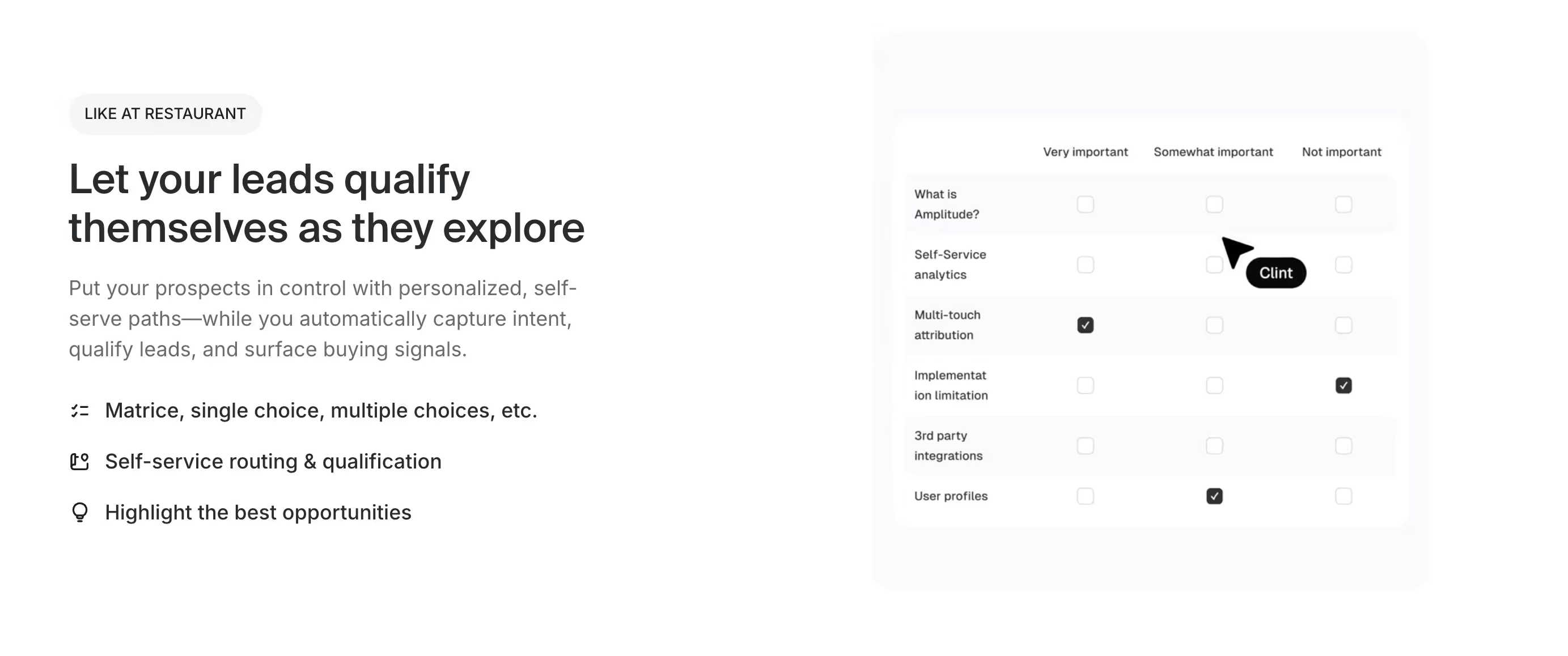
Challenge
Presales teams waste significant time on unqualified prospects who book live demonstrations without basic product research or understanding of technical requirements. These prospects often haven't completed fundamental homework about whether the solution aligns with their technical needs, leading to generic product overviews rather than focused technical validation sessions.
The time investment extends beyond the actual demonstration. Presales engineers spend hours preparing demo environments, adjusting data sets, and customizing technical presentations for prospects who may not be ready for implementation or may lack budget authority. This preparation time represents opportunity cost when the same resources could support qualified technical evaluations.
Discovery calls frequently reveal that prospects have unrealistic expectations about technical capabilities, lack necessary infrastructure prerequisites, or haven't considered integration complexity. These misalignments become apparent only after significant presales investment in demonstration preparation and delivery.
Prospects often arrive at live technical demonstrations unprepared for technical discussions, requiring presales engineers to spend valuable session time on basic product education rather than addressing specific technical validation questions or competitive differentiation.
Solution
Interactive technical assessment demo centers enable prospect self-evaluation before presales engagement. These assessments can include technical requirement checkers, integration compatibility evaluations, and implementation readiness guides that prospects complete independently.
Integration requirement checkers within demo centers help prospects understand technical prerequisites and compatibility considerations before requesting live demonstrations. These tools can evaluate existing technical infrastructure, identify potential integration challenges, and provide clear technical requirements documentation.
Technical prerequisite walkthroughs prepare prospects for more effective live technical discussions. By completing technical education modules and assessment tools, prospects arrive at live demonstrations with better technical understanding and specific validation questions.
Benefits
- Higher qualified prospect rates for live technical demonstrations result from effective self-service technical qualification. Presales teams report significant improvements in demonstration effectiveness when prospects complete technical assessments before live engagement.
- Better prepared prospects with specific technical questions enable more focused and valuable technical demonstrations. Instead of covering basic technical concepts, presales engineers can address specific integration challenges, advanced technical requirements, and competitive technical differentiation.
- Reduced time spent on basic technical education allows presales engineers to focus on complex technical validation and relationship building activities that directly impact deal progression and technical win rates.
- Clear technical requirements understanding before sales cycles begin eliminates many technical objections and concerns that can delay deal progression or create technical evaluation complications later in the sales process.
When to use
- Before scheduling live technical demonstrations, prospects should complete relevant technical assessment and education modules to ensure productive use of presales time and resources.
- During initial technical discovery processes, demo centers can supplement discovery calls with comprehensive technical requirement evaluation and compatibility assessment tools.
- For complex integration requirement assessment, interactive technical evaluation tools can help prospects understand implementation complexity and technical resource requirements before formal technical validation begins.
- When evaluating multiple technical stakeholders, demo centers can provide different technical assessment paths for various roles and technical expertise levels within the prospect organization.
Use case 2: RFP and technical validation responses
Presales teams face increasing demands for comprehensive technical responses in formal evaluation processes. Traditional RFP responses rely heavily on written documentation that doesn't effectively demonstrate technical capabilities or differentiate solutions from competitive alternatives.
Challenge
Time-intensive RFP response preparation and customization consumes significant presales resources. Each formal technical evaluation requires custom technical documentation, architectural diagrams, integration specifications, and security compliance information that must be tailored to specific prospect requirements.
Difficulty demonstrating complex technical capabilities in written responses limits presales teams' ability to showcase technical differentiation and competitive advantages. Static documentation cannot effectively communicate interactive technical capabilities or demonstrate integration complexity and flexibility.
Need for consistent technical positioning across multiple opportunities creates challenges when multiple presales engineers are involved in RFP response development. Ensuring accurate, consistent technical messaging while customizing responses for specific technical requirements requires significant coordination and review processes.
Solution
Interactive technical capability demonstrations for RFP submissions provide dynamic technical validation that goes beyond static documentation. These demonstrations can showcase specific technical requirements, integration scenarios, and compliance capabilities relevant to formal evaluation criteria.
Visual technical architecture walkthroughs and integration showcases within demo centers enable prospects to understand technical implementation approaches and complexity considerations more effectively than written descriptions or static diagrams.
Reusable technical validation experiences for procurement processes reduce RFP response preparation time while providing more compelling technical demonstrations than traditional documentation approaches.
Benefits
- Faster RFP response preparation with reusable technical content enables presales teams to respond to more formal evaluation opportunities while maintaining high-quality technical validation experiences.
- More compelling technical demonstrations than static documentation improve technical evaluation outcomes and competitive positioning in formal procurement processes.
- Consistent technical positioning across all evaluation processes ensures accurate technical messaging while reducing coordination and review requirements for RFP response development.
- Higher win rates in formal technical evaluation scenarios result from more effective technical capability demonstration and differentiation compared to documentation-only approaches.
When to use
- During formal RFP and technical evaluation processes, interactive demo centers can supplement written responses with comprehensive technical validation experiences that evaluators can explore independently.
- For security and compliance technical validation, demo centers can provide detailed compliance demonstrations, security architecture walkthroughs, and certification documentation in interactive formats.
- When demonstrating complex integration capabilities, visual integration showcases and API demonstration tools can provide more effective technical validation than written integration specifications.
- In competitive technical evaluation scenarios, interactive technical differentiation demonstrations can highlight unique capabilities and competitive advantages more effectively than written competitive comparisons.
Use case 3: Sales team technical enablement
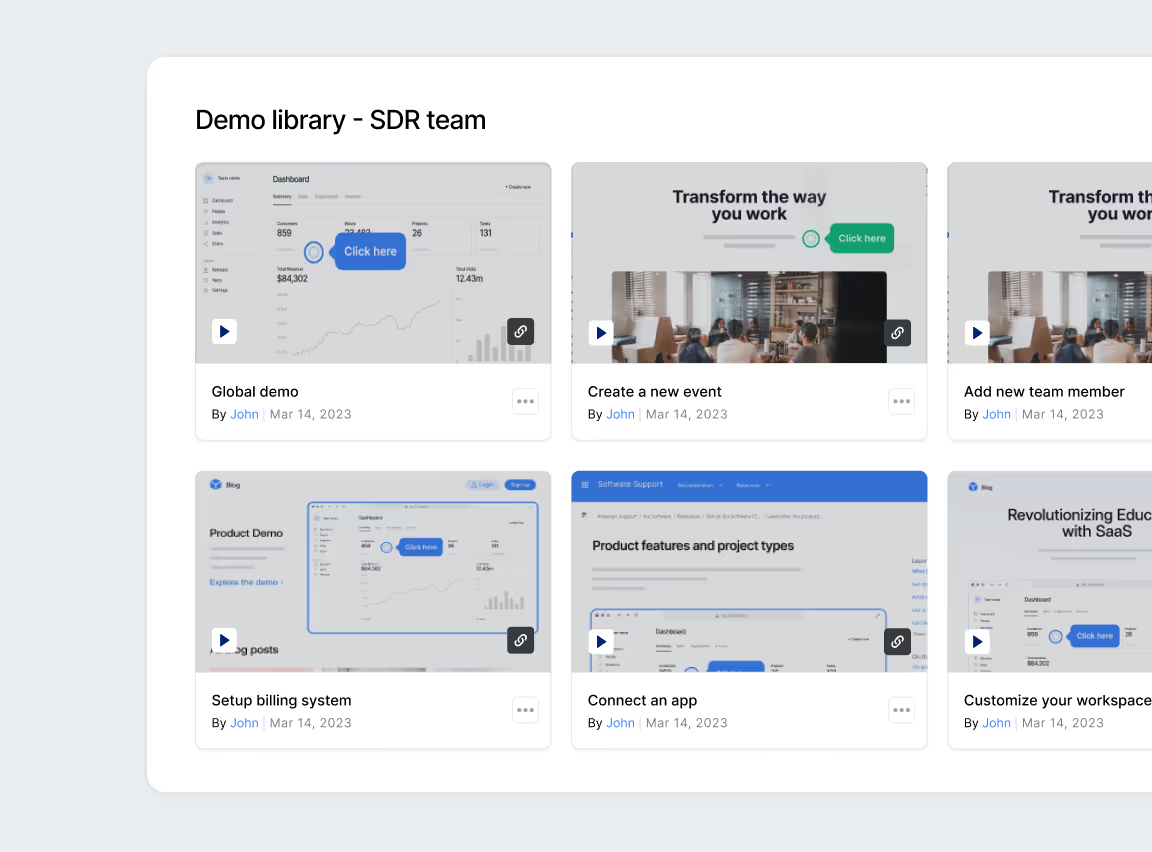
Account executives need technical demonstration capabilities to support their sales processes, but presales teams lack bandwidth to provide comprehensive technical support for every sales opportunity. This creates dependencies that slow sales cycles and limit sales team technical effectiveness.
Challenge
Sales teams dependent on presales for basic technical demonstrations create resource allocation inefficiencies. Every technical question or basic technical demonstration request requires presales coordination and availability, limiting sales team agility and responsiveness.
Limited presales availability for all sales opportunities means some technical inquiries go unsupported or experience significant delays. This limitation can impact competitive positioning and prospect engagement in time-sensitive technical evaluation scenarios.
Inconsistent technical messaging from non-technical sales representatives creates potential confusion and accuracy concerns when account executives attempt to handle technical discussions without presales support.
Solution
Technical demo libraries for sales team self-service use provide account executives with comprehensive technical demonstration capabilities for common technical scenarios and questions.
Guided technical demonstration flows for account executives enable sales teams to deliver consistent, accurate technical information while identifying opportunities for presales escalation when complex technical validation is required.
Technical objection handling resources and competitive comparisons within demo centers equip sales teams with tools and information needed to address common technical concerns and competitive technical questions independently.
Benefits
- Sales teams can handle technical discussions independently for routine technical scenarios, improving sales process efficiency and reducing dependencies on presales resources for basic technical support.
- Presales resources reserved for complex, high-value opportunities enable more strategic presales resource allocation and improved support for technical validation scenarios that require deep technical expertise.
- Consistent technical messaging across all customer interactions results from standardized technical demonstration content and guided technical conversation flows within demo centers.
- Improved sales team confidence in technical conversations leads to better technical qualification, more effective technical objection handling, and stronger technical relationship building with prospect technical stakeholders.
When to use
- For standard technical feature demonstrations that don't require customization or complex technical validation, sales teams can leverage demo center resources independently.
- During initial technical interest qualification, account executives can use technical assessment and demonstration tools to gauge technical fit and identify opportunities for presales engagement.
- When presales resources are unavailable for immediate technical support, demo centers provide sales teams with technical demonstration and validation capabilities that maintain sales process momentum.
- In territory coverage situations across multiple time zones, demo centers enable consistent technical support availability regardless of presales team location or availability.
Use case 4: Outreach optimization
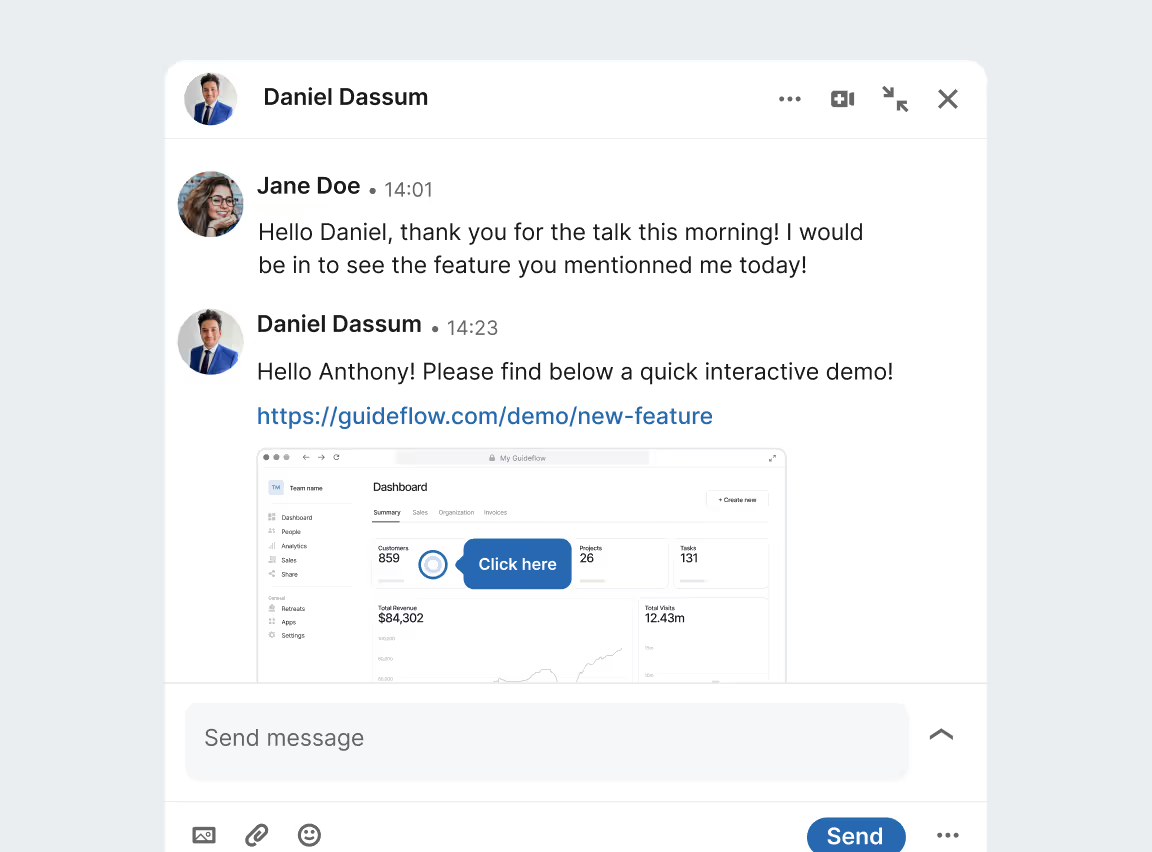
Presales teams increasingly need to support broader sales and marketing initiatives beyond direct technical validation, including outbound campaigns, follow-up communications, and sales team training programs that extend technical demonstration capabilities across the entire revenue organization.
Challenge
Traditional presales workflows struggle to support the volume and variety of technical demonstration needs across sales and marketing functions. Outbound campaigns require immediate technical engagement that can't wait for presales scheduling, while follow-up communications after live demonstrations often lack compelling technical reinforcement materials that prospects can revisit and share internally.
Sales teams need comprehensive technical enablement resources tailored to different buyer personas, industries, and use cases, but presales teams lack bandwidth to create and maintain multiple demo variations. New sales team members require extensive technical training that traditionally demands significant presales mentoring time.
Trade shows and events create unique challenges where technical demonstrations must engage attendees immediately without presales presence, while customized sales pitches for specific prospects require technical content adaptation that strains presales resources during busy periods.
Solution
Embed interactive technical experiences directly in outbound campaigns to enable immediate product interaction and qualify technical interest before prospect engagement escalates to live demonstration requests. This approach transforms cold outreach into warm technical conversations by allowing prospects to explore relevant product capabilities independently.
Create comprehensive technical demonstration libraries organized by buyer persona, industry vertical, and use case that sales teams can access independently for customized technical positioning. These libraries serve dual purposes as prospect-facing demonstrations and internal training resources for sales team technical education. Develop portable technical demonstration experiences for trade shows and events that operate independently of presales presence while capturing detailed engagement analytics for lead qualification and follow-up prioritization.
Provide customizable technical demonstration templates that sales teams can adapt for specific prospect requirements without presales involvement, while maintaining technical accuracy through approved content frameworks and guided customization tools.
Benefits
- Enhanced outreach campaign effectiveness through immediate technical engagement that qualifies prospects before they request live demonstrations, improving both response rates and lead quality for presales follow-up.
- Comprehensive sales team technical enablement through self-service demonstration libraries that reduce training time while improving technical positioning consistency across all customer interactions.
- Improved follow-up communication impact through reusable technical assets that prospects can revisit and share internally, reinforcing product value and maintaining engagement throughout evaluation cycles.
- Expanded technical demonstration reach through trade show and event applications that generate qualified technical leads without requiring presales presence or coordination.
When to use
- In outbound campaign sequences to provide immediate technical engagement and qualify prospect interest before scheduling live presales demonstrations.
- For follow-up communications after live demonstrations to reinforce key technical points and provide prospects with shareable technical validation materials for internal stakeholder education.
- As sales team training resources for new team members learning technical positioning, competitive differentiation, and product demonstration techniques.
- At trade shows and events where technical demonstrations must operate independently while capturing engagement data for follow-up qualification and presales prioritization.
- For customized sales pitches where specific prospect requirements demand tailored technical positioning but presales resources aren't available for custom demonstration creation.
Demo center implementation for presales teams
Step 1: Set up CRM integration
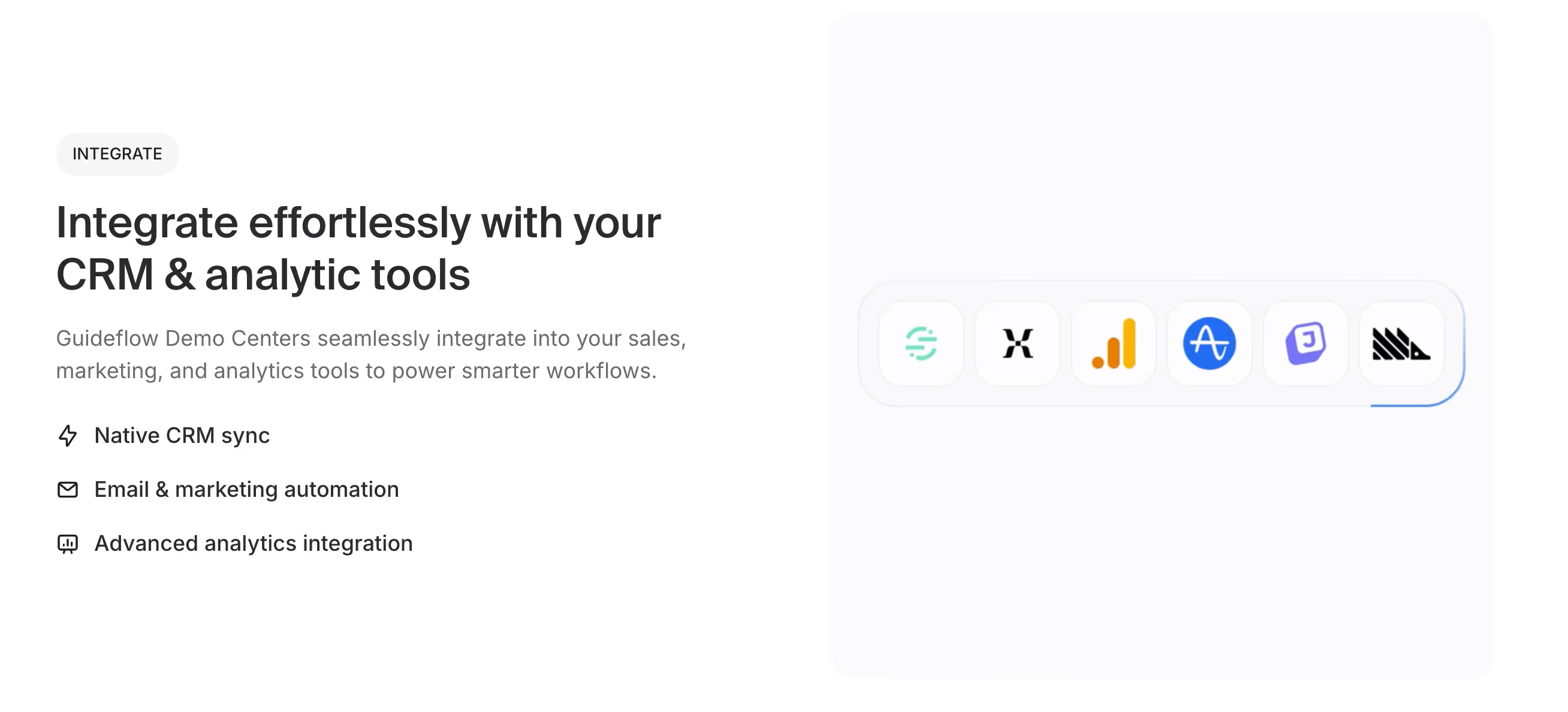
Successful demo center implementation begins with comprehensive CRM integration that ensures seamless data flow between prospect engagement and existing sales workflows. Guideflow provides native connectors that automatically create Salesforce activity records, update HubSpot lead scores, and trigger Pipedrive follow-up sequences based on demo center interactions.
Implementation process
- Connect your CRM through Guideflow's integration dashboard
- Map behavioral data fields to existing contact properties
- Configure automated workflow triggers that notify reps about hot prospects requiring immediate follow-up
Step 2: Organize your workspace
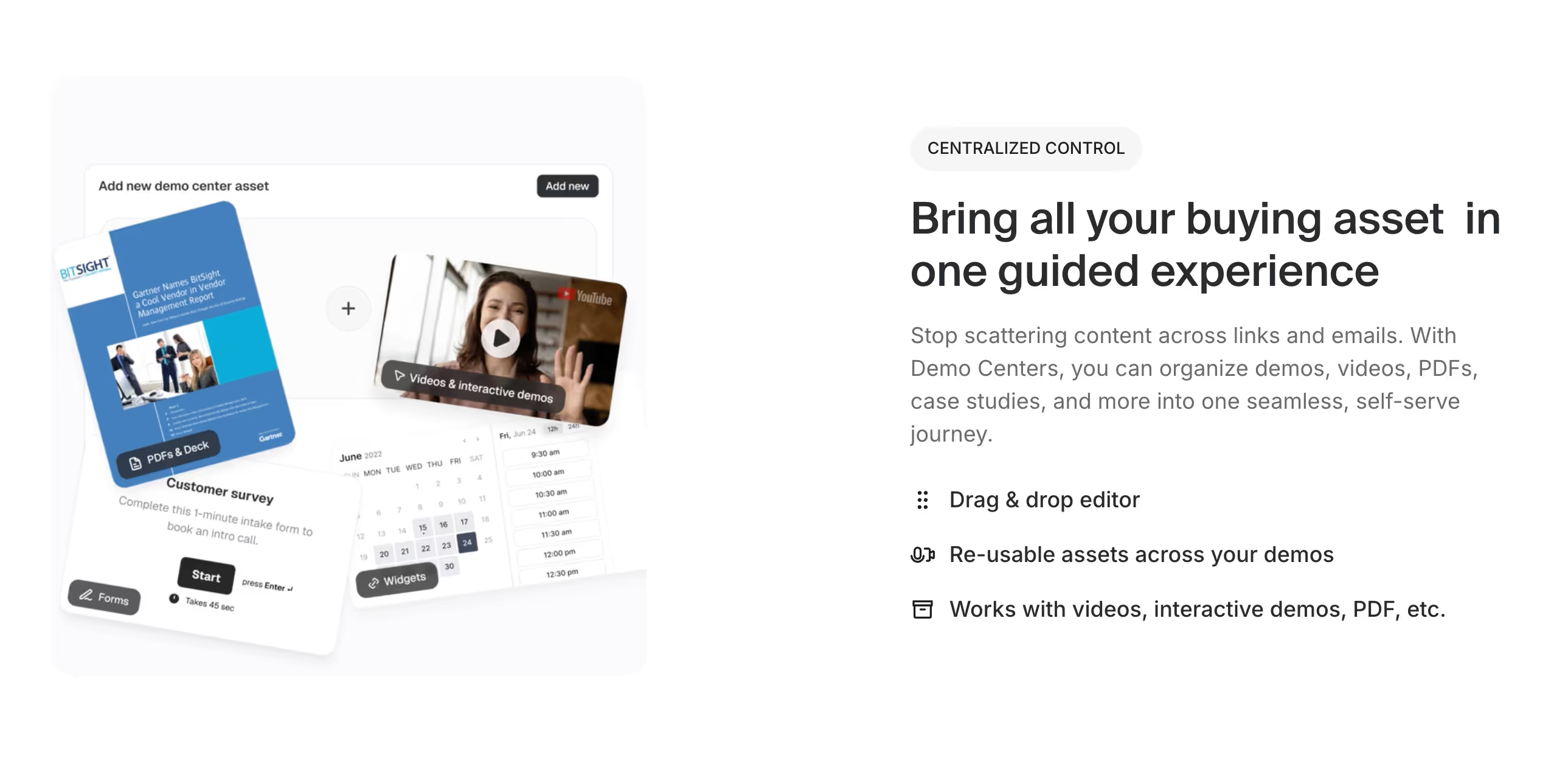
Workspace organization becomes critical for team adoption and efficiency. In Guideflow, sales teams should create dedicated folders for different prospect segments, customer types, or sales processes.
Folder setup process
- Click the "+" button beside "Workspace" on your dashboard
- Create folders by criteria like industry vertical, company size, or buyer persona
- Examples: "Enterprise Prospects," "Mid-Market Opportunities," "SMB Leads"
- Drag and drop folders to organize them as public (all team access), shared (specific team access), or private (individual rep use)
Step 3: Connect outreach tools
Outreach tool connections amplify the power of demo centers by embedding interactive experiences directly into existing sequence workflows. Guideflow integrates with Salesloft, Reply, and Lemlist, allowing BDRs to include demo center links in email templates and call scripts while capturing engagement data.
Integration steps
- Connect your outreach platform through Guideflow's API
- Create template libraries with embedded demo links
- Set up automated follow-up sequences that adjust based on prospect engagement levels and feature interest patterns
Step 4: Establish measurement frameworks
ROI measurement frameworks should focus on metrics that directly impact quota attainment and deal velocity. Guideflow's analytics dashboard provides detailed insights into prospect behavior, engagement depth, and feature exploration patterns that predict deal likelihood and optimize resource allocation.
Key metrics to track
- Demo-to-close conversion rates
- Average sales cycle length
- Pipeline progression velocity
- Demo completion rates
- Stakeholder sharing behavior
- Time spent exploring specific features
Step 5: Plan team adoption strategies
Team adoption strategies require different approaches for BDRs, AEs, and Sales Leaders based on their unique responsibilities and success metrics.
Role-specific implementation
- BDRs: Create organized prospect folders, embed demos in outreach sequences, track engagement for lead qualification
- AEs: Use stakeholder management features, follow-up automation, and analytics for discovery conversations
- Sales Leaders: Leverage team performance dashboards for coaching insights and resource allocation decisions
Step 6: Monitor success metrics
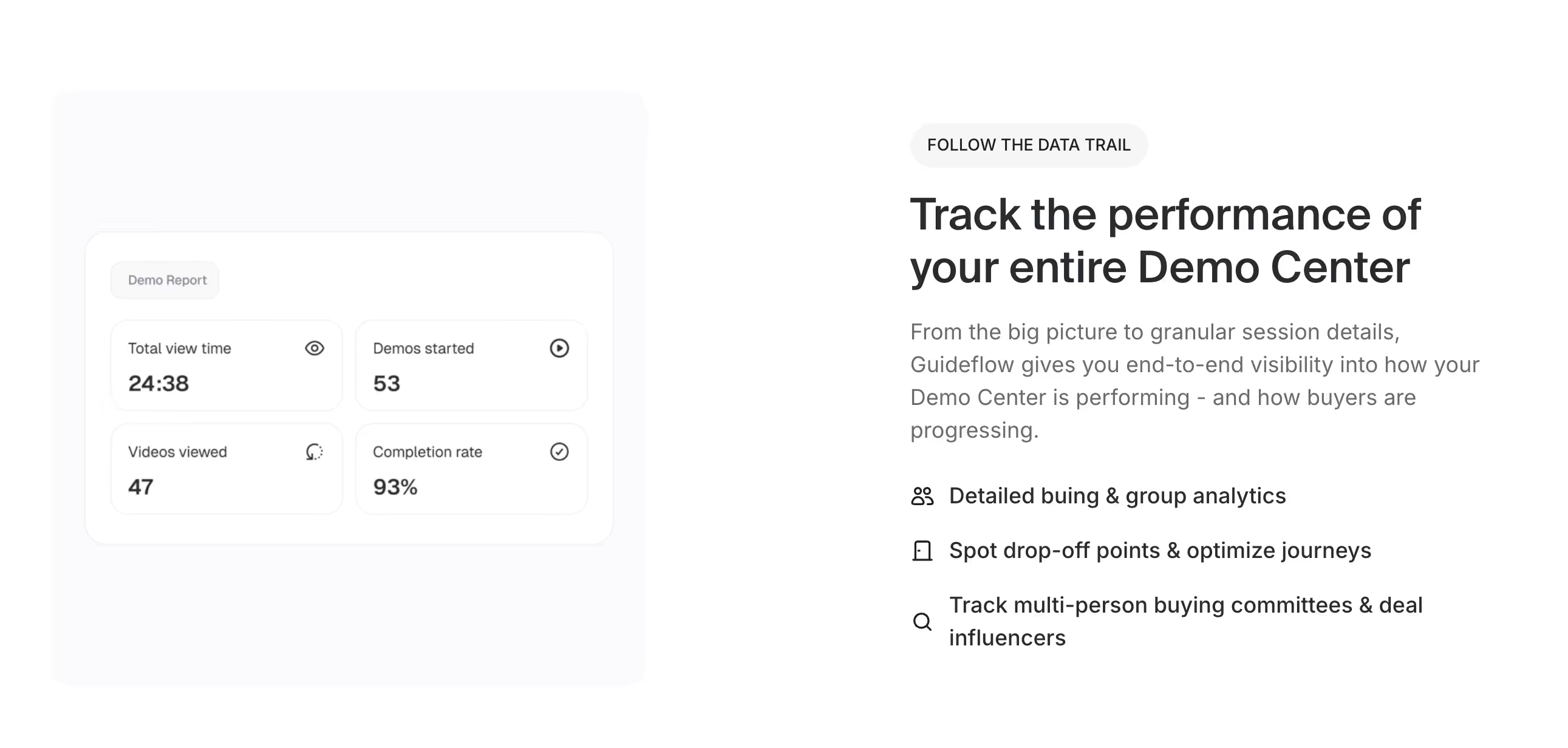
Success metrics and pipeline optimization frameworks should establish baseline measurements before Guideflow implementation and track improvements across key performance indicators.
Optimization tracking
- Monitor changes in average deal size, sales cycle length, and win rates
- Track leading indicators like demo engagement rates and follow-up response improvements
- Use Guideflow's reporting features to identify highest-probability opportunities
- Focus team effort on patterns that correlate with successful deals
Conclusion
Demo centers represent a strategic competitive advantage for presales teams facing increasing technical demonstration demands with constrained resources. By enabling technical self-service, improving qualification effectiveness, and providing scalable technical enablement, demo centers transform presales from a reactive, resource-constrained function to a proactive, efficiency-optimized technical validation process.
The presales scaling benefits extend beyond simple time savings. Organizations implementing comprehensive demo center strategies report fundamental improvements in technical qualification rates, sales team technical confidence, and overall technical evaluation effectiveness. 67% of technical buyers prefer self-service evaluation before live demonstrations, making demo centers essential for meeting modern technical buyer expectations.
Implementation success depends on integration with existing presales workflows rather than replacement of core presales functions. The most effective demo center strategies enhance presales expertise through strategic automation of routine technical activities while preserving the relationship building and complex technical validation capabilities that define presales value.
For presales teams ready to scale their technical demonstration capabilities, platforms like Guideflow provide presales-focused demo center solutions with integrated technical validation tools, comprehensive analytics, and seamless workflow integration. The combination of interactive technical experiences and presales efficiency optimization enables technical demonstration at scale without sacrificing quality or personalization.
Ready to scale your presales capabilities with demo centers? Experience how interactive technical demonstrations can enhance your presales productivity and technical validation effectiveness. Start building more efficient technical qualification processes that free your presales expertise for high-value technical validation and competitive differentiation.
FAQs
How do demo centers integrate with our existing presales workflow?
Demo centers complement your current process by adding a technical self-qualification layer before live demonstrations. Prospects engage with technical content first, providing valuable insights for more focused presales conversations. Integration with CRM systems ensures engagement data enhances existing lead scoring and opportunity management processes.
Will demo centers replace the need for presales engineers?
No, demo centers enhance presales efficiency by handling routine technical education and qualification. This frees presales engineers to focus on complex technical validation, custom integrations, and high-value opportunities. The goal is strategic resource reallocation rather than resource reduction.
How do we handle complex technical questions that arise from demo centers?
Demo centers can include comprehensive technical FAQ sections and escalation paths to presales engineers. The engagement data also helps presales engineers prepare more targeted responses to specific technical concerns. Interactive chat or scheduling integration can provide seamless escalation when prospects need additional technical support.
How do demo centers help with presales demonstration fatigue from repetitive demos?
Demo centers eliminate the need to deliver the same basic product walk-throughs multiple times daily by providing comprehensive, interactive technical experiences that prospects can explore independently. This reduces demonstration fatigue while ensuring consistent technical messaging. Presales engineers can focus their live demonstration time on advanced technical validation and custom scenarios rather than routine product overviews.
Can demo centers demonstrate our complex integrations and APIs?
Yes, demo centers can showcase API functionality, integration workflows, and technical architecture through interactive simulations without requiring live system connections or complex setup. Visual integration demonstrations and API testing environments provide effective technical validation for integration-focused evaluations.
How do we measure ROI from presales demo centers?
Track key presales metrics including qualified demo rates, time-to-technical-validation, presales utilization rates, and sales team technical confidence scores. Most teams see measurable improvements within 45-60 days. Organizations report 73% higher engagement and 60% reduction in demo preparation time as primary ROI indicators.
What happens when prospects need custom technical demonstrations?
Demo centers handle standard technical validation, while custom demonstrations remain a core presales function. The qualification data helps presales engineers prepare more relevant custom experiences. Understanding prospect technical interests and concerns through demo center analytics enables more focused and effective custom technical validation.
How do we keep technical content current with product updates?
Most demo center platforms offer content management workflows that integrate with product release cycles. Technical teams can update interactive content as efficiently as traditional documentation. Version control and approval workflows ensure technical accuracy while streamlining content maintenance processes.
Can demo centers support complex enterprise technical evaluations?
Yes, demo centers excel in enterprise scenarios by providing multiple technical stakeholders with relevant content access. Each technical evaluator can explore capabilities independently without coordinating presales schedules. 85% of technical evaluations include multiple demonstration phases that demo centers can support effectively.
How do we use demo centers for outbound campaigns and lead qualification?
Demo centers can be embedded directly in outbound campaign sequences to provide immediate technical engagement. Prospects interact with relevant product capabilities before requesting live demonstrations, improving lead quality and qualification rates. Engagement analytics help identify the hottest opportunities for presales follow-up while eliminating unqualified prospects who don't engage with technical content.
Can sales teams use demo centers for training and enablement?
Yes, demo centers serve dual purposes as prospect-facing demonstrations and internal training resources. New sales team members can learn technical positioning and product capabilities through the same interactive experiences prospects use, ensuring consistent technical messaging while reducing presales training time. Demonstration libraries organized by persona and use case provide ongoing enablement resources for the entire sales organization.
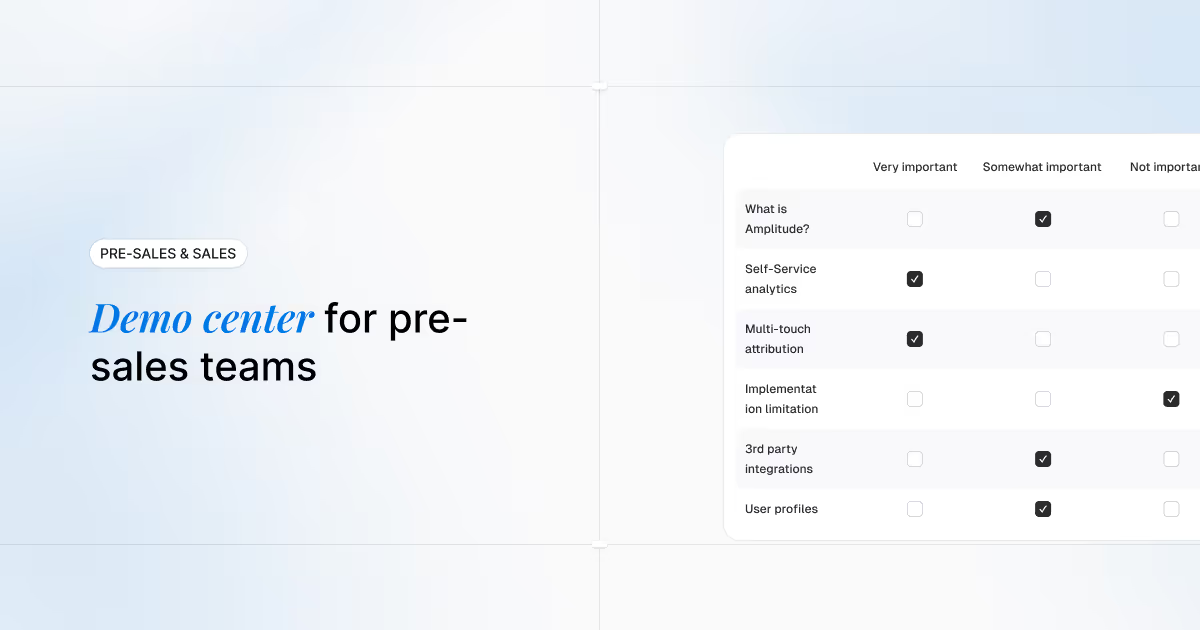


.avif)
.avif)
.avif)
.avif)

.avif)

